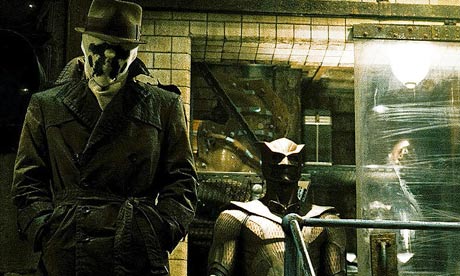
To acolytes of Alan Moore's genre-transforming graphic novel, Zack Snyder's big-screen adaptation of Watchmen represents geek nirvana. It is uncompromisingly violent and sexualised, just as the comic book was, and it remains, at its heart, an examination of superheroic existential dread, a topic not previously known for packing out multiplexes. The relief is palpable in fanboy circles.
Elsewhere, the critics are split. Many suggest that Moore may have been correct in his assertion that this tale of an alternate 80s populated by masked adventurers is unfilmable. The graphic novel, after all, featured a vast array of background information in the form of autobiographies, newspaper articles and even an entire comic book within a comic book. How could a movie ever hope to tell half the story, or convey a quarter of its richness? Yet others are positively overwhelmed by what they recognise as a hugely ambitious and uncompromising effort to adapt difficult source material.
Watchmen is set in an America in which Richard Nixon is serving an unprecedented third term as president after winning Vietnam with the help of Dr Manhattan, the comic book's only true superhero, and the Comedian, a nihilistic, heartless bully and would-be rapist who represents everything wrong with the bad ol' US of A. The pair are the only remaining "costumed adventurers" permitted to operate after the activity was made illegal five years earlier. But the sudden murder of the Comedian starts off a chain of events which will pull many of the surviving former heroes back into the fray, for better or worse.
The background to all this is imminent nuclear apocalypse, with the famed Doomsday Clock fixed at five minutes to midnight. Billions of people wait to see whether Manhattan will intervene to halt the standoff between Nixon and the Soviets. And where might be the cerulean superman? Well, he's in self-imposed exile on Mars.
"There is something exhilarating in the sheer madness of Watchmen," writes our own Peter Bradshaw. "The synapse-frazzling ambition is impressive as it lurches from hyperreal Earth to photoreal Mars; it is dizzy, crazy and quite sexy – when it's not being self-indulgent and pointless. If it doesn't quite hang together or add up, or stick faithfully to the comic-book original, these offences aren't major. What a spectacle."
"After the revelation of The Dark Knight, here is Watchmen, another bold exercise in the liberation of the superhero movie," writes the Chicago Sun-Times' Roger Ebert. "It's a compelling visceral film – sound, images and characters combined into a decidedly odd visual experience that evokes the feel of a graphic novel. It seems charged from within by its power as a fable; we sense it's not interested in a plot so much as with the dilemma of functioning in a world losing hope."
And the naysayers? "David Hayter and Alex Tse's screenplay introduces so many characters and so much information that, unless you're familiar with the novel, it's near impossible to follow," writes the Sunday Times' Cosmo Landesman. "And the film is constantly leaping off into flashbacks and subplots, which undermines the dramatic momentum of the storyline set in the present.
"The incoherence wouldn't matter if we had a terrific bunch of characters to follow, but they're mostly dullards. Silk Spectre II (Malin Akerman) is this drippy chick who looks good in latex, Dr Manhattan (Billy Crudup) is too absurd for words, and Nite Owl II (Patrick Wilson) is a boring, middle-aged guy with a gut. Only the brilliant Rorschach (wonderfully played by Jackie Earle Haley) and the Comedian (Jeffrey Dean Morgan) have any on-screen vitality."
Watchmen throws up an interesting question. Is one more likely to enjoy a film because one is familiar with the source material? The answer in this case is overwhelmingly "yes". Yet I have spoken to a number of friends who never got past the bright, shiny yellow cover of Moore's graphic novel, with its iconic, blood-stained smiley face badge, and all enjoyed the film immensely.
Does it matter if a film fails to follow the rules of good movie-making if the spectacle remains resplendent? A huge part of the original graphic novel's appeal is the way it looks back at the past 50 years of an alternate 20th century in which real-life superheroes changed everything. A movie which failed to find a way of incorporating this backstory into the screenplay would simply not have been Watchmen. And yet it seems to be these divergences and detours from a linear narrative which have upset certain critics.
Would we have been better off with no Watchmen film at all? Should Moore's vision have been left on the page? I for one would have missed out on an enthralling 160 minutes at the movies – like Ebert, I'm hoping to catch it again, on Imax, later this week, so I'm not entirely sure I care that much whether the film "works" or not. What do you think?

